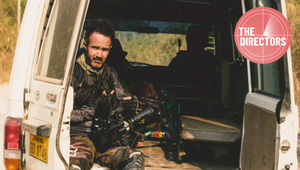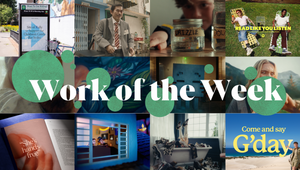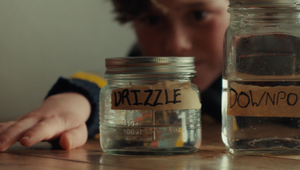
Finely Sliced: Feeling the Rhythm of the Edit with Zach Pridding

Zach Pridding is an editor at Chief. His artistic vision, passion for storytelling and strong communication skills has enabled him to edit award winning work for the likes of New Balance, BBC and Noel Gallagher, just to name a few.
Zach isn’t afraid of a challenge and works collaboratively with the post production team to create content that captures and inspires audiences around the world.
When he’s not at the editing desk, spinning captivating stories for international brands, high profile music artists and top agencies, you’ll probably find Zach playing video games, watching his favourite films and working on his own personal documentary ventures.
LBB> The first cut is the deepest: how do you like to start an editing project?
Zach> Organisation is key. I am a firm believer in ‘The Bus Theory/Factor’, Long story short, If I was hit by a bus (hopefully I am not writing this into existence), can another editor or assistant understand my file management and editing workflow? You want to be as streamlined as you can be and being organised can give you that. As simple as organising by shoot date and scene.
Once I have it in a place where I can find what I need, I then start to go through all the rushes, pulling my selects, marking any notable clips. If it’s a sound design or music based edit, I usually start grabbing the assets I need and have an idea before I start the edit.
LBB> Non-editors often think of editing just in technical terms but it’s integral to the emotion and mood of a film. How did you develop that side of your craft?
Zach> I think watching and consuming a wide variety of media, from films, TV to video games and music. But analysing why the good examples work. It can be subtle reaction shots in a drama or a sound cue in a thriller.
On top of consuming a wide variety, I think cutting all types of genres is a great way for an editor to learn the norms of those genres and why they work, once you have a grasp on that you can start subverting those norms and attacking it with your own creativity, pulling emotion from every piece of work.
I think having knowledge on the filming side of things is also useful. I try to film a lot outside of editing and this has opened up how and why certain shots work, why some don’t. It has taught me the importance of shooting to edit.
LBB> How important is an understanding of story and the mechanics of story?
Zach> I think that’s what an editor's purpose is for. As an editor you are the storyteller, how you put together different takes and angles dictates the pacing and emotion of the story.
Certain briefs might not have a clear cut story, but as an editor you can bring that story to life (even if it is in your own head). With commercials it’s important to understand what the client/brand is trying to achieve and engage with the story, and it’s your job to achieve that goal. Similarly when working with directors it’s crucial to let their visions come to fruition, but don’t be afraid to present your own ideas.
LBB> Rhythm and a sense of musicality seem to be intrinsic to good editing (even when it’s a film without actual music) – how do you think about the rhythm side of editing, how do you feel out the beats of a scene or a spot? And do you like to cut to music?
Zach> Editing is rhythm. With or without music, editors are always thinking of and feeling the rhythm and crafting the rhythm is the best part of the process. It can revolve around music, sound design and action. Being able to feel the rhythm means knowing when a shot lingers a frame too long or an action doesn’t flow into the next shot. It can dictate the pace of the edit.
I am an editor who loves working with music. Cutting music videos are some of my favourite edits, creatively you can be quite free with them. However don’t fall into the trap of cutting to the beat! It can become repetitive and basic (every now and again is fine!). Something as simple as having the vision/action hit on the beat is more effective, don’t be afraid of letting the choreography or lyrics dictate the rhythm and pace of your edits.
LBB> Tell us about a recent editing project that involved some interesting creative challenges
Zach> Recently, I did a new music video for Noel Gallagher’s High Flying Birds. The first challenge is quite a common one which was taking a project over from a different editor. Which is always a challenge in itself. Taking an already established edit and working closely with the director to create an entirely new vision but built from the original edit was challenging.
It was also my first time working with the director. Which is also a challenge as you want to go above and beyond and show off your creativity but reminding yourself you need to stick to the vision. I did love working with this director and other directors who know exactly what they shot and exactly what they want!
LBB> How important is your relationship with the director and how do you approach difficult conversations when there is a creative difference of opinion?
Zach> The relationship is key and having that trust and understanding from a director is the most important aspect and will lead to great results. When working with new directors it is so important to discuss both yours and their ideas to understand if you are both on the same wavelength creatively as that is integral to enjoying the work and having a good relationship.
In my experience most directors are open to having creative conversations and are always willing to experiment in the editing process. It's important to not get carried away and stray too far from their vision and it’s vital to understand the reasoning behind their ideas. But again don’t be afraid to present your own ideas, a great director will value it.
LBB> What’s harder to cut around – too much material or not enough? (And why?)
Zach> I think both have pros and cons.
It always depends on the edit, but I think every editor will agree that not having the coverage you need is worse. However even too much material might not be enough, it all depends on the substance. You could have 30 takes and not one fits the edit, pace, cut points and emotion. Or you can have five takes and every single one hits the mark! So sometimes the less might be better!
LBB> Which commercial projects are you proudest of and why?
Zach> A few years ago CHIEF did a commercial for Talisker whiskey and I was given the task of making the social films. It was a unique brief as most of the time an agency or client will come to us with a built social campaign and we follow it to the tee. This time the social films were open for experimentation. I have always been a sucker for great sound design in edits, it’s what I always encourage new editors to never neglect and I wanted to implement it into the edits.
For these edits I wanted to follow the trend of really soothing and satisfying sounds that capture audiences that are scrolling through TikTok or Instagram and have a much needed break from the overwhelming stream of social media we all receive these days!
Learning the difference between the sound hot water makes compared to cold water changed my perspective on sound design as a whole, it’s so subtle but crucial.
LBB> There are so many different platforms for film content now, and even in advertising something can last anything from a few seconds to a couple of hours. As an editor, are you seeing a change in the kind of projects you’re getting from brands and agencies?
Zach> I don’t think I have been in the industry long enough to notice a change, It’s usually been the case since I have started that with most edits there needs to be cutdowns and re-sizes for social media.
A recent change I have seen which I will talk more about later on is the rise in brands having in-house post teams now.
LBB> Who are your editing heroes and why? What films or spots epitomise good editing for you?
Zach> Sally Menke is an editing legend, Lee Smith, Thelma Schoonmaker and more recently Jennifer Lame for her work on Oppenheimer.
Whiplash, Dunkirk, Dune and Saving Private Ryan will always be my favourites for best editing All combine my favourite aspects of editing. Seamless storytelling!
LBB> How does editing in the commercial world differ from the film world and TV world?
Zach> The commercial world has a much tighter timeframe, ranging from one week to one day turnaround sometimes! Sometimes commercials can suffer from having too many chefs in the kitchen and creatively can take longer to get the juices flowing.
Whereas long-form work a lot of the time is the director and editor working collaboratively, bouncing ideas around and experimenting. But can become repetitive and can range from months to years. So pros and cons to each!
LBB> Have you noticed any trends or changes in commercial editing over recent years?
Zach> So the biggest trend I have seen on top of more social cutdowns is that more brands have their own production/post teams.
This means that less work is going out of house and not on freelancers or post-houses desks. Going forward this means that brands will have way more creative control over their work, and the demands for more fast paced social content editors will increase. The lines between offline and online will become more blurred as I find with most social projects nowadays you are adding graphics and other assets before it’s in its final stages.
It will be interesting to see where it goes.















